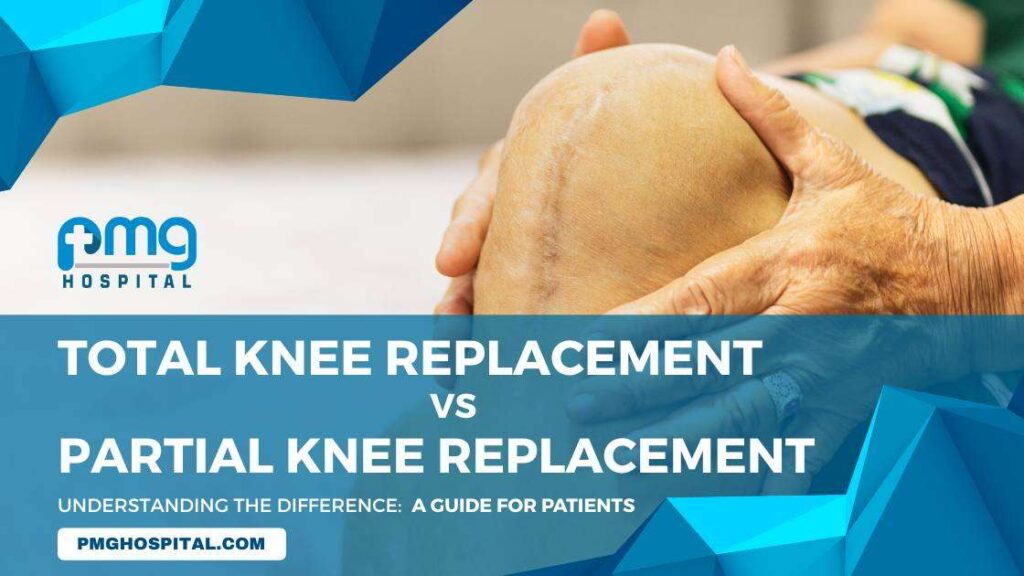In the past few decades, knee replacement surgery has developed enormously, providing a second chance to thousands of patients worldwide. Today, people with knee osteoarthritis can live pain-free thanks to treatment choices such as total and partial knee replacements, which let them take back control of their lives.
Depending on the intensity of your knee injury and its impact on your overall health, your healthcare provider will determine whether a partial or a total knee replacement is the best option for your condition. If you are considering either treatment option, you may wonder whether the treatment will be right for you or what the risks and benefits will be.
Here is a detailed guide to explain the differences between total knee replacement and partial knee replacement surgery to help clear up any confusion you may have.
Knee Replacement Surgery: What Is It?
The total knee replacement procedure is called knee arthroplasty or knee replacement surgery. This procedure is performed to repair a damaged knee, and injuries or conditions such as osteoarthritis may cause damage to the knee joint. Using metal alloys, high-grade plastics, and polymers, a prosthesis is made to replace the damaged bone and cartilage of the thighbone, shinbone, and kneecap.
It usually takes about two hours to perform a knee replacement surgery. Before, during, and after the procedure, antibiotics are administered intravenously to the patient to prevent infection. General or spinal anesthesia will be prescribed to the patient during the surgery.
Partial Knee Replacement Surgery: A Quick Overview
The partial knee replacement procedure, or unicompartmental knee arthroplasty, can be very effective in treating patients with partial knee damage, i.e., damage to a specific part of the knee.
Earlier, this procedure was performed primarily on older patients as they were less likely to exert themselves to the point of injury. Partial knee replacements are becoming more popular among the younger population due to their lower recovery time and decreased postoperative pain.
But this surgery isn’t for everyone. Around 5%-6% of knee arthritis patients can get partial knee replacements.
Partial Vs Total Knee Replacement: Key Difference
Knee replacement surgery is often the best action when people suffer from osteoarthritis and other knee conditions that cause pain. It is possible to surgically remove part or all of the knee joint in this operation. Surgeries are carried out to remove the damaged part of the knee joint and replace it with a plastic or metal artificial joint to replace the damaged one. A knee replacement may take several months to recover, but its long-term benefits are long-term or lasting, as there is permanent relief from pain.
Partial Knee Replacement
Partially replacing a knee consists of replacing only the affected area while preserving the knee’s anterior and posterior cruciate ligaments. Among the factors that would make you a perfect prospect for a partial knee replacement are:
- Intact knees with minimal deformities
- Less than 180 lbs in weight.
- Living a sedentary lifestyle
- Before surgery, ensure that you have a good range of motion
A partial knee replacement may seem simpler than a total knee replacement, but it is vital to understand the differences between the two procedures. It’s important to understand that each knee replacement surgery is unique and has its risks and benefits.
|
Advantages
|
Risks
|
|---|---|
|
It retains the majority of knee tissues
|
Revision surgery risk is higher
|
|
Dissection of fewer bones and soft tissues
|
Partial knee replacements could potentially result in worsening knee function |
|
Recovering faster
|
Transfusions, blood clots, and blood loss are rare complications |
|
A wider range of overall mobility and a higher level of patient satisfaction |
Components used in partial knee replacements have a shorter lifespan than those used in total knee replacements. |
Total Knee Replacement Surgery
A total knee replacement operation refers to completely removing the knee joint and replacing it with an artificial component or components replicating the joint functions. The treatment is relatively safe and effective for managing the pain and stiffness caused by knee osteoarthritis.
A total knee replacement surgery may be a good option for patients with persistent, severe knee osteoarthritis that cannot be controlled by conservative treatment options, such as painkillers or physical therapy. In addition, there are other considerations to take into account, including:
- A knee that feels unstable and on the verge of giving out
- Deformity of the knee or leg
- Inflammatory knee arthritis, such as rheumatoid arthritis, results in severe pain and stiffness in the knee joint.
- The pain in your knees prevents you from performing basic activities.
There are no age or weight restrictions for total knee replacement surgery. A healthcare professional will assess your pain level and level of disability when determining the best option for you.
|
Advantages
|
Risks
|
|---|---|
|
An average knee replacement component can last between 10 and 15 years |
Costly
|
|
Improved functional scores
|
Heavy use of the implant results in wear and tear
|
|
Satisfaction of patients
|
Cells that form scars
|
|
Surgically repaired knees are less painful and have greater mobility. |
Damage to your nerves and Artificial joint infection
|
Undoubtedly, partial and total knee replacements have a higher success rate than any other knee surgery. However, some patients may experience some pain and stiffness after the surgery.
Total (TKR) Vs Partial Knee Replacements (PKR): Which One Is Best For You?
Getting a successful total or partial knee replacement is the best solution for persistent knee pain.
To diagnose your joint pain and determine the best treatment, our orthopedic surgeon in Ahmedabad provides comprehensive tests, including X-rays and MRIs. We conduct thorough examinations to identify the most suitable surgical option for your condition..
Whether you are experiencing knee pain or you know that you need to undergo a partial or total knee replacement to address your knee problems. Get in touch with PMG Hospital for a state-of-the-art partial or total knee replacement surgery at an affordable price.
Visit our website and find one of the best knee replacement hospitals in Ahmedabad, India.



